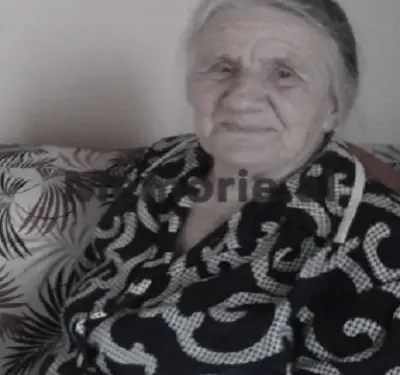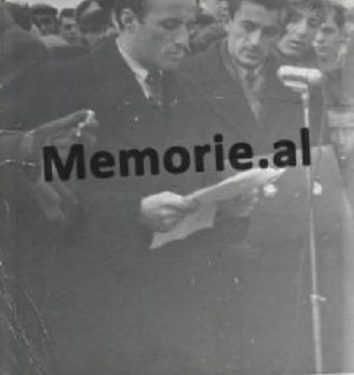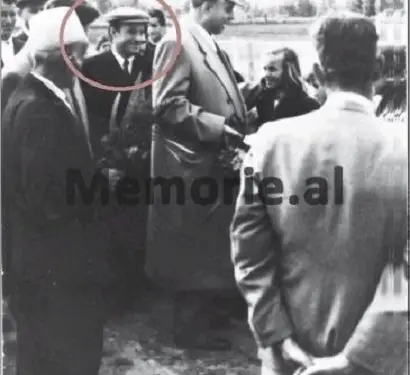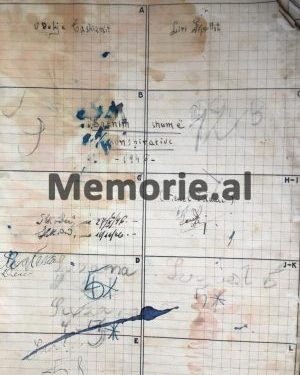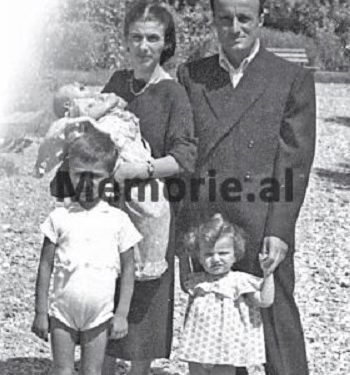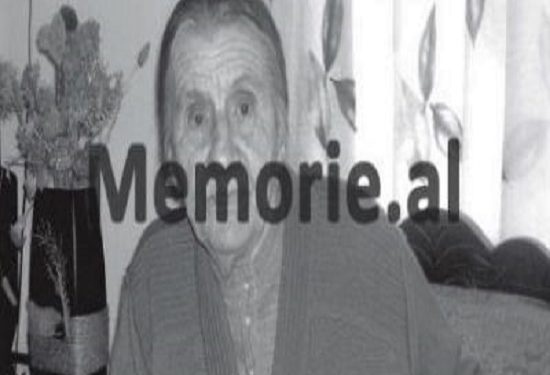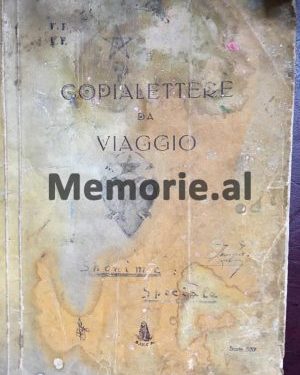Dashnor Kaloçi
Memorie.al publishes the unknown story of Zenel Islami originally from Iballa of Puka, otherwise known as “Little Flower” of Migjen, who after joining the ranks of the partisan forces of the National Liberation Army, immediately after the end of the War when was at the age of 20 was appointed and served as First Secretary of the Party Committee of the district of Puka, and then in the same position in Lezha and Elbasan. Rare testimony of his wife, 92-year-old Drita Gjylbegu Islami, regarding the mystery of the murder of her husband on July 9, 1961 in the village of Labinot in Elbasan, where he had gone to participate in the Army celebration, the machinations of the people of State Security who were told that “Zeneli had killed himself with seven bullets”, Haki Toska’s visit that night to their house in Elbasan, the funeral in the city of Shkodra where even his relatives were not allowed and no one attended from the high party and state instances, the pressures made by the Security and the Shkodra Party Committee to divorce her husband after her death, as well as the macabre event in the city cemetery where she found Zenel’s grave broken and the guard testimony about him that had happened.
Although almost 60 years have passed since the mysterious death of her husband, Zenel Islami, or as she is otherwise known as the “Little Flower of Migjen”, 92-year-old Drita Gjylbegu-Islami has preserved deep in her memory everything that happened to man its most beloved in life. Not only what he has seen and experienced himself, such as: the last meeting with Zenel, the arrival of the mandate at home by her husband’s colleagues, accompanied by people from the State Security, the conversation with Enver Hoxha’s envoy, a member of the Politburo , Haki Toska, who in the late hours of that night went urgently to Elbasan, escorting Zenel’s body to the city of Shkodra, the Security people who accompanied him under surveillance, but also everything else that happened in the city of Shkodra, both before and after burial, when she went to the cemetery and found the grave broken?!. She even remembers in detail all the conversations with the heads of the Executive Committee and the Shkodra Party, who asked her with various pressures to divorce her dearest man of the heart, who in On the morning of July 9, 1961, he passed away in mysterious circumstances, somewhere near a spring in the village of Labinot in Elbasan, where he served as chairman of the Executive Committee for two years.
Mrs. Drita, how long have you lived with Zenel and your children in the city of Elbasan, where did the event of July 9, 1961 take place?
For almost two years. There in Elbasan we lived in a simple apartment like all other citizens.
Zeneli, asked him to go to Elbasan himself?
In Elbasan Zenel was named after he came from the Soviet Union, where he studied at the Faculty of Philosophy in Moscow. He was first appointed secretary of the Party Committee, then chairman of the District Executive Committee. In that position he replaced Tahir Demi (originally from Chameria), who in 1961 was arrested along with a group of Chams. Zeneli had a friend Tahir Demi, probably also for the fact that a brother of Sejkove, Temes of Tahos, was married to a girl of my tribe, the daughter of my uncle and aunt. To be honest, when they transferred Zenel from Puka, where he was expected to return and announced his appointment in Elbasan, he burned me, but you could not speak at that time. He himself was upset.
Were there times when Zeneli expressed dissatisfaction with that appointment?
I have only seen him three times more upset. The first time Lekë Berisha was killed and it was not known how he was killed. Zeneli was an only son and had Lekë Berisha as his brother. The second time, in the late 1950s, when a friend of his told him in good faith that State Security had set up a dossier for him. When he found out what the accusation was about, he laughed and told me that the mountain does not break for a pair of broken pears. The third time, when he returned from Moscow and did not find his mother.
Where did Zeneli work before?
In the Party and Executive Committees in Puka, Shkodra, for a while and in Lezha.
How do you remember your last meeting with your husband Zenel Islam in Elbasan?
I will never forget that day. It was July 8, 1961. Zeneli ate some bread, as it was lunch time, and said he would go back to work to meet the people, who were waiting for him, 79 people who had registered their names for the meeting. At that time, Zeneli was the chairman of the Executive Committee of the Elbasan district and had a lot of work to do. That day he was quite calm, just like all the other quite ordinary days. He went to work and after coming from the reception of the people, he said to me: “I finished all the work today, so that he would not go to the office tomorrow. At that moment, the phone rang and after talking to someone, Zeneli told me, “I have to go after someone calls me,” and mentioned the name of a general who was looking for him.
Who was that general, Zeneli told you?
He told me that he was wanted by the General of the Ministry of Interior, Mihallaq Zicishti. After an hour, Zeneli came back home, where I waited for him to come out dressed and said to me: “Light, let’s leave for today what we have planned, because we will do it on Sunday when we return from the holiday. (We had planned to go to visit some of our people, from my tribe of Gjylbegëve and Hys Zaja, who was from Shkodra and worked as a prosecutor there in Elbasan). But, nevertheless, tomorrow at 7 in the morning I will come to pick you up and we go to the party together. I asked him where he was going. He did not know exactly. I do not want to go, he told me, I had something else in mind, but they insist. He was talking about Llambi Peçini. And he left. Before leaving the house, the little girl cried. Zeneli took her in his arms and after kissing her hard he took something he had from his pockets and gave it to her. It was quite quiet.
What happened next?
The next morning I got dressed and waited for Zeneli to come, as he told me before he left. Two or three hours went by and nothing was heard. Around 10:00 in the morning, a friend of mine who worked with the Women’s Organization came and I went shopping with her. After I got the food of the week, I came home again and since Zeneli was late, I prepared dinner to have it ready. Throughout the day I said to myself: why was Zeneli late?! He was not in the habit of not reporting. At 16:00 there was a knock on the door of the house and I saw there Arif Peqini, who was the secretary of the Party Committee of the district of Elbasan, the well-known doctor, Ali Deliallis, and some cadres of the State Security. (At that time I worked as a chief of staff in a company in Elbasan and I knew them). I invited them inside and said: Where is Zeneli? They told me: Sit down once. We want to talk about something, but keep the kids away. After I took the three children to the other room, or to our neighbors, to lawyer Avni Skrapari (I do not remember well), I sat down. The party secretary told me, “Zeneli killed himself.” I jumped to my feet and told them it is not possible! Why did he kill her, what happened!
How did he answer you?
The Secretary of the Party, Arif Peqini (who was also our neighbor, we lived opposite), told me: “Light, Zeneli danced and sang with the couple, he kept up to 100 people with conversations and conversations all night there in the village of Labinot where It was us. Zenel was taken in the morning, shaved and left, and instead of coffee he ate a plum. After that he went to the crown and there he shot himself seven times with a gun there to crown “. I told Arif that he agreed, but why did he do that, how he leaved the children orphaned! How he fell on himself seven times with a rifle, and with what rifle he fell! “With his rifle,” they told me. I replied, “Well, I’m going to see if he has a rifle.” And I got up and went into the room to see if there were pistols, which he never took with him. There I found Zenel’s pistol with red gloves, wrapped in clothes as he usually left it. One of the Security guards, who accompanied me from behind in the room, said, “Give it to me,” and took it. As they sat down, I went out and picked up Bedri (he was 10 years old at the time) and the other two children, Agron (5 years old) and Zana (7 years old) and told them: This job has happened, let’s hold on. The kids started crying and I was like frozen.
Did you ask for explanations again about what had happened?
I was asked again to be told, how and why that thing had happened. Arifi told me: “There was no concern, it was all right and quiet. We do not know how it is”! I saw that he was not telling me the truth. I asked him when he had last seen Zenel. He did not answer me. I asked him to whom they had slept and whether they had all slept in one house. Arifi told me he had been to another house. If I am not mistaken, Arifi had left the house where we lived, around five o’clock in the morning. He had come and gone immediately. I heard the noise of the car and said it was not Zeneli. Arifi told me that Zeneli had left a letter. I asked for it, but it was not given to me then or later. I did not see any letter. After a while they left and there were only two of them staying at home, completely unknown, who accompanied me and followed me every move I made around the house. In the meantime, I called my brother in Shkodra, Xhavit Gjylbegun (a well-known doctor), and he told me that he had been informed and that he was leaving urgently for Elbasan.
Did anyone from the Party Committee and the Executive of Elbasan come that evening, or from the senior leadership there for consolation?
Around 22:00 of that dinner, shortly before Xhavit (brother) came from Shkodra, Haki Toska, a member of the Politburo, came to our house and told me: “I came by direct order of Enver Hoxha. I am commanded by him to say unto thee, what wilt thou of us? Speak! This is our calamity first, and then yours. After raising Zenel a lot, Haki Toska continued: “Enver Hoxha did not cry for his mother, while for Zenel Islam he cried”. Hakiu stayed there until my brother came from Shkodra and when he was leaving he told me: “We will complete everything; we have an order from Enver Hoxha”.
How did you decide on Zenel’s funeral, where would it take place?
The leaders of Elbasan did not want me to leave the city. I was told that permission was needed from the Ministry of Interior. I told Haki Toska, he allowed me. After Haki Toska left, his brother, Xhaviti, told me that it was good to bury Zenel in Shkodra and so we decided. A few minutes later, around 12:00 at night, they brought my body to the house. Before bringing the body home, they came and got Zenel’s clothes to wear. At that time I said to him: Bring me here at home to look at the clothes that Zeneli was wearing. They said, ‘Yes, yes, but they never brought it to me. Of Zenel’s belongings they only brought me the watch. Nothing else was given to me. And they took his notebook and never returned it to me.
You saw the corpse, how many wounds did Zeneli have?
Although the coffin was only discovered for a few seconds, I saw that Zeneli had only one bullet wound on the left side of his forehead. But blood was still flowing from inside the clothes to the chest.
When did you leave for Shkodra and who was accompanied by the people of power and the party of Elbasan, Zenel’s colleagues?
That same night, shortly after one o’clock at night, we left for Shkodra where the funeral would take place. None of them came, only Çesk Shoshi, who was the chief, or deputy chief of the Elbasan Security, came with us to Shkodra. He was sent to accompany us on the road with my brother, Xhavit, and to my family members in Shkodra, to Gjylbegët, where people would be received who would come for consolation for Zenel.
Did many people come for comfort?
They came, but not many. Vague words were opened, how it happened, why it happened, the time was short, we arrived in Shkodra at four in the morning, at four in the afternoon it was the funeral. There were none of the cadres of the party and the government, both from Shkodra and from Tirana or Elbasan. A large truck with people that had left Puka to come to us for condolences and for the funeral of Zenel, they did not leave him and returned him to the road.
Why did none of Zenel’s colleagues come for consolation?
With the exception of Sadik Rama, the party secretary of the Shkodra Executive Committee who stood by me all the time to see what I was going to say, no one from the Party Committee or the Executive Committee came there for consolation. Only Rrok Kodheli from Lezha came home and cried, but did not attend the funeral. They left neither him nor a few others who wanted to come. The apostles were charged with the task of preventing them from attending the funeral. A few days later, at night, Thoma Liti came with his wife, Lirija. It was sarandjot, but we had worked together in Puka.
When was the funeral ceremony held and who attended there from Zenel’s colleagues?
The funeral was held that day at 4:00 pm and there were very few of us. From the family was Zenel’s sister, two cousins and two nephews. They were also of my tribe, Gjylbegaj, who were more numerous. Except for the tribe, no one from the party and power attended the funeral. Cesk Shos was also summoned and he did not come to the funeral. Only Sadik Rama was at the funeral and he was standing next to us to hear something and see who was attending. I was not at the funeral (because that’s our habit), but my people and Zenel’s people told me all this. Even those friends and comrades who came from Elbasan, such as Qamil Çela, etc., did not allow them to go to the funeral. They came home alone for consolation and fled again to Elbasan.
At the house of your brother, Xhavit Gjylbegu, did you open the coffin?
We were not allowed to open it and the room where the coffin was located was guarded by two Security men. But two cousins of Zenel from Puka, Smajl Avdi Shkreli and another, whose name I cannot remember now, found the moment and entered through the back window of the house to see it. They opened it and came and told me: “Zeneli did not kill himself; he had some other wounds in the chest”.
Who gave the last word in the cemetery about Zenel?
What a word, no word was kept about Zenel in the cemetery.
What did they tell you about what happened to Zenel?
A few days later, I was called by the Secretary of the Party Committee of the Shkodra district, Sul Baholli, who told me that he had a direct message from Enver Hoxha to call me. He highlighted Zenel’s figure, merits and work, elevating and appreciating her with the best words. Two days later he called me again and told me that Zenel’s figure was being watched because not only was the suicide being condemned, but there could be something else as well, such as his insistence on defending the declassed in Iballa. Again, another day, they called me and told me not to worry that things would get better. The next day a party instructor, V. Xh., Who had been my friend since the time of the War, came and started the pressure. That was not enough. Then the threats started. But then, we as a family were treated very badly.
Specifically, how, what happened to you?
I was constantly called to the Shkodra District Party Committee, where I was interrogated by various people, asking me all kinds of questions about Zenel and pressuring me to separate him to death. There were times they would put me in an office and leave me seven or eight hours all alone. The door opened and some head extended to see me. I had neither water nor movement. After seven or eight hours, someone would come, once again, and say to me, “Go today, and come tomorrow at seven o’clock.” I was told to think well. It was repeated the next day. Every time I left home, I wondered if I would return home. The biggest pressure was to separate Zenel. To make a public statement that I am sharing it, that I go back to the maiden name and that he was wrong. So I punished him too. But I never accepted such a thing, saying, “I have always been his and I will remain so until he dies. Tell me what he has done.” They gave me no reason, but continued questions and pressures on me, which continued for a long time. I was then summoned to the District Party Bureau meeting. I was tortured with questions, they told me that: I had to choose either Zenel or the Party. I was told that I had to measure well, that I had children, that Zenel’s work was punishable. I could not bear it and at first I thought of saying the words I had said to one of those who came to my house. I told him: you know better who killed Zenel, that the man who sings all night does not commit suicide in the morning! Do not forget the day when Mhill Doçi got up and took me in defense. In the end he said: “What are you asking for this, you do not see how it is done. We know more about Zenel than we know this”?! A man who had come from the Central Committee, (so he said), though I did not know him, wanted to say something to Mhill, but it was seen that it was all over. At the end of a seven-hour meeting, I was expelled from the party and my document was confiscated.
What about a friend of Zenel, did he come to your house in Shkodra to tell you how the truth stood?
Seven days after Zenel’s funeral, Fahri Kraja came from Tirana, who at that time was working in the Security of the leadership, with a high position if I am not mistaken. I had Fahri as a childhood friend, he was like a house boy. He stopped me on the street where I was with my brother, Xhavit Gjylbegun, and after separating me, he said in good faith: “Drita, stay calm because Zeneli had nothing.” After his words I calmed down and went to the Party Committee where I was constantly called more calmly, being convinced that Zeneli had nothing against his country. Sometime later, different friends from Puka and Elbasan came to our house in Shkodra, who told me that it was not possible for Zeneli to commit suicide. His close friends from Elbasan insisted on this, such as: the well-known lawyer Avni Skrapari, Qamil Çela, Pertefi (I do not remember the surname), Zeneli’s driver, Galip Mekshi, Hamit Gjylbegu in Shkodra, etc.
After that event, where did you settle down for work in Shkodra?
After the event I became seriously ill and for four years I was very serious. After four years of being ill, I went to look for a job in the Executive Committee of Shkodra, but they did not give me one. After that I was forced and went to the office of Bilal Parruca, the Chairman of the Committee, whom I told to give me the broom and wipe the city streets, as I had no other option to raise the children. I told him that what Zeneli had left me, we had sold for a living and I had no choice but to raise the children. Bilal had been a close friend of Zenel, they had studied together in Moscow and the two families had lived in the same house.
He kindly sent me to the Orphanage in Shkodra, telling me: “As you are raising those orphans at home, take care of the orphans wherever you go.” There at the Orphanage I worked as a housekeeper and storekeeper for 21 years until I retired.
Did Zenel have a pension for the children?
For many years they did not give me Zenel’s pension, telling me that he did not belong to us, as he had killed himself. Only when Enver Hoxha went on a visit to the district of Puka (we were told by different people that he had spoken well of Zenel), they gave us half a pension, telling us that this was our due, as Zenel had killed himself. During all those years, and until the end of that system, I had State Security people behind me, who followed me and monitored me everywhere. I knew well who they were. My brother, Xhavit Gjylbegu, also had many problems with what happened to us.
Let’s go back to the event of July 9, 1961. What is your opinion at that time, but even later after so many years, Zeneli committed suicide?
No one knew Zenel better than I did. You can hide from everyone, but you cannot hide from people. I had even a thread of doubt; I was not separated from Zenel anywhere. I never believe in suicide. I have always said and I say that there was no reason for Zeneli to commit suicide. First, that he had grown up an orphan himself, secondly no one kills himself with a few bullets, one on the left side of the forehead and some on the chest and third, we were a happy family. Zeneli was an honest man; whoever knew him has never forgotten him. And no one can believe that a 36-year-old man, without any harm, with any concern for position to go to suicide. That night, when they brought me the news, one of the Security men, not Cesc, because we knew Cesc and we knew he was a good man, I told him, “You know better than him that he did not kill himself of this opinion “.
Drita Gjylbegu: “In Shkodra I was pressured to separate Zeneli and Gac M. told me to separate, while Mhill Doçi defended me”
In her exclusive testimony for Memorie.al, 92-year-old Drita Islami-Gjylbegu, the wife of Zenel Islami, former chairman of the Party Committee of the Elbasan district in 1960-1961, (or as she is known differently as “Luli i small of Migjen “) who on the morning of July 9, 1961 was found killed in unknown circumstances in the village of Labinot in Elbasan where he had gone for the Army holiday, also tells of the great pressure on her in the Shkodra Party Committee , just a few days after that event. Regarding this, Drita Islami-Gjylbegu, recalls: “Every day of the week I was picked up and taken home by car and taken to the Party Committee of the Shkodra district, where all sorts of faces asked me about what had happened to My husband, Zenel Islam, wanted to learn something from me, and it lasted for seven days. of 80 members of the Pensioners’ Party Organization (where I did Party life, as I was not at work) told me: “You have to separate Zenel, as our Party condemns suicide. You do not need to go to court, you just say yes, because we share it. “I refused, saying I never shared it. After that, the secretary of the Party Committee, Gac M., called me, saying the same thing: “Divide Zenel and remove the headscarf.” I told him that I could remove the headscarf, but I never shared Zenel. In those moments there came Mhill Doçi, the chairman of the Executive Committee of Shkodra, who kindly told me “Light, come to work and work. When I told him what they were asking me, his eyes filled with tears and he left without saying a word.”
Drita Gjylbegu: “When we went to the cemetery, we found the grave broken; the guard told us that the Security had opened it”
In her exclusive interview for Memorie.al, Drita Gjylbegu Islami, also talks about what happened years later with the grave of her most beloved man. In this regard, she recalls: “I used to go to the cemetery twice a week. One of those days, as I was approaching his grave, someone passed by and grabbed the bouquet of flowers I had in my hand, which he threw into a large canal of water. From that day on, every time I went to the cemetery, I did not take flowers in my hand to take them to Zenel’s grave. Another thing that has left us and our family in doubt is the opening of Zenel’s grave, which has been opened four times in seven months. When we went there we found the grave soil moved. On one of those occasions, the cemetery guard called me and said: Do you want to see Zenel’s body again, as it was the day he was buried? I said, “No, I could not see him.” I then asked him to tell me what it was like to have his grave opened several times. In good faith he said to me: “Last night, they, (he was talking about the Security people), opened Zenel’s grave and told me to cover it. I left it uncovered to wait for you and ask if I wanted to see it. One more time”. The cemetery guard explained to me that Zenel’s body was completely intact, because a water line was passing there. I told this to my brother, Xhavit, as soon as I got home and he said to me: No, do you not mind?! “Immediately he got on his bicycle and went to the cemetery and saw with his own eyes what I told him” ./ Memorie.al




